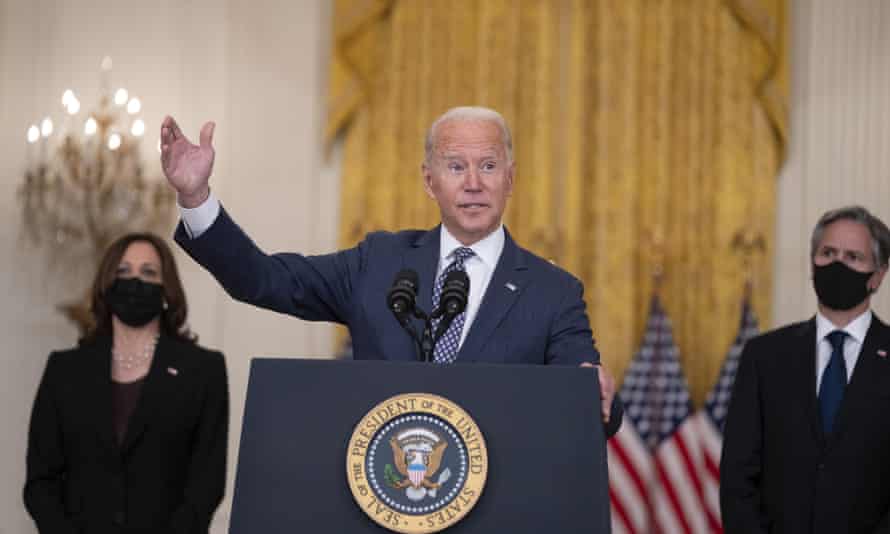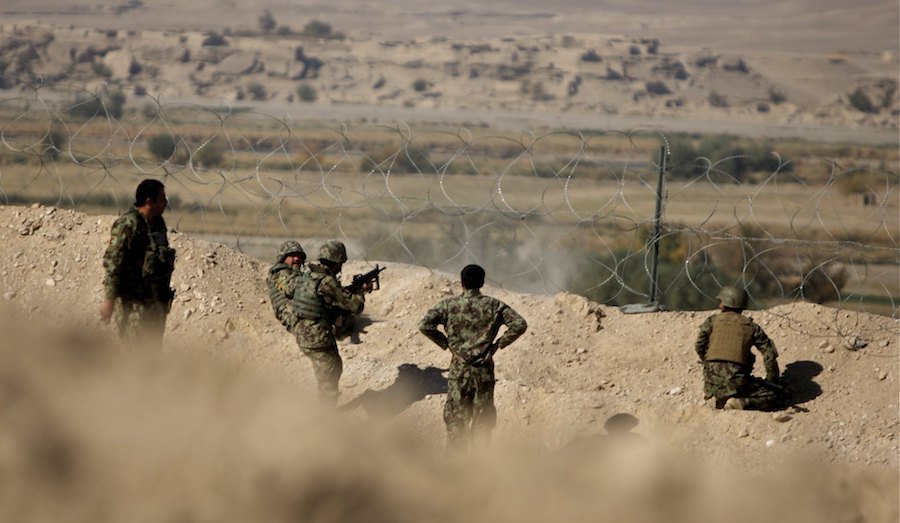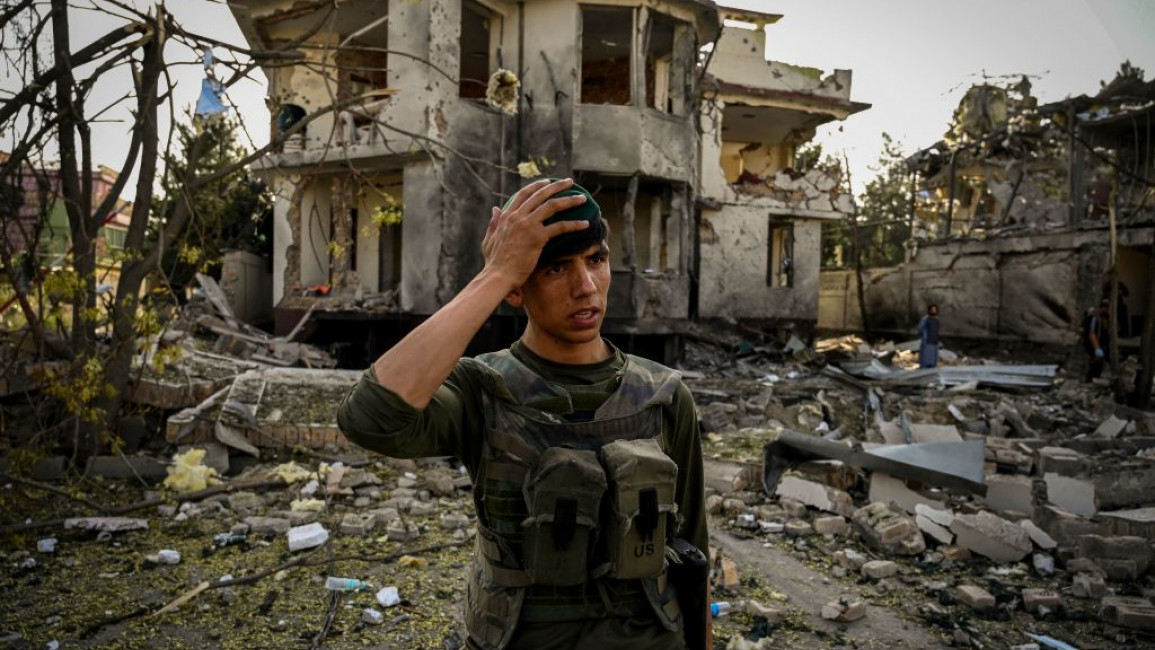The LGBT+ community in Afghanistan now fear more violence under the Taliban rule as many try to evacuate.
The New Arab Staff & Agencies
21 August, 2021

LGBT+ Afghans fear for their lives under Taliban rule [Getty]
It was never easy being gay or transgender in Afghanistan. Now it could be deadly, according to LGBT+ Afghans, whose fear of violence under the Taliban is driving a frantic bid to escape.
But how any evacuation might work is another matter, with scant practical support coming from overseas and even less hope that Islamist militants will let them into the airport.
"If I find a visa and a country gives me permission to leave, of course, I will risk everything to get out," said one gay Afghan student, whose name was withheld for his protection.
"Any country, but not here. Living here means nothing for us."
The odds are stacked against an escape as the 21-year-old hides indoors, paralysed by fear of what might happen on the street, with few exit routes open amid chaotic airport scenes.
Nor is it clear where LGBT+ Afghans might be welcome to set up home or whether sexuality or gender identity are criteria for automatic asylum in many countries around the world.
Canada has pledged to resettle 20,000 Afghans, explicitly including LGBT+ people in its commitment.
In offering such clear assurance, Canada is an outlier.
Irish media has reported that LGBT+ people will also be among its 150 Afghan refugees brought to the country. Ireland's foreign ministry did not respond to a request for comment.
But in other Western democracies, including the United States and Europe, there was no such clarity.
On Monday, the day after Kabul fell, U.S. President Joe Biden wrote a memo granting $500 million for "unexpected urgent refugee and migration needs of refugees, victims of conflict, and other persons at risk" in the tumult.
U.S. State Department spokesperson Ned Price told reporters on Tuesday that the United States would "bring to safety... vulnerable Afghans" without specifying who. Asked if this covered LGBT+ Afghans, the State Department declined comment.
Britain says it will welcome up to 5,000 Afghans under year one of a resettlement programme that will prioritise women, girls and religious and other minorities.
Again, it made no mention of LGBT+ Afghans and did not respond to a Thomson Reuters Foundation request for comment.
Many European leaders are wary of accepting any migrants - of any type - and some countries, including Australia, have explicitly rejected an Afghan influx.
Turkey is bolstering its border walls with Iran, which neighbours Afghanistan, expressly to keep out Afghan migrants.
RELATED
How 'Allahu Akbar' became a rallying cry against the Taliban
Secrets and Fear
Rainbow Railroad, a Canadian-based LGBT+ advocacy group, has urged governments to help gay and trans Afghan refugees.
"Public attitudes...towards LGBTQI+ people are extremely negative, which leads members of the LGBTQ+ community to keep their gender identity and sexual orientation a secret in fear of harassment, intimidation, persecution, and death," it said.
"Now, with the return of the Taliban, there is an understandable fear that the situation will worsen."
U.S. novelist Nemat Sedat, a gay Afghan-American who left his homeland aged 5, then taught at an Afghan university from 2012 to 2013, told the Thomson Reuters Foundation he had been contacted by more than 100 LGBT+ Afghans desperate to flee.
"People are messaging me, telling me 'What can we do? We're going to get exterminated. The Taliban are going to weed us out and kill us,'" Sedat said in a video call.
Sedat said he was working with an American based in Kabul and lobbying his congressman to try and arrange a flight out.
Contacted over WhatsApp, the American confirmed he was at Kabul airport, but said the situation was "really bad" and he was unsure even how to get LGBT+ people safely through the city.
Chaos has swamped the airport, with reports of stampedes, Taliban fighters turning back Afghans with travel documents and women throwing their babies over the wall to U.S. soldiers.
Since Sunday, 12 people have been killed in and around the airport, according to NATO and Taliban officials.
(Reuters)
Biden’s Afghan chaos means Europe can no longer rely on him. Let’s hope a more balanced security relationship emerges

Sat 21 Aug 2021
The North Atlantic measurably widened last week. The more Joe Biden tried to shift blame for the Afghan chaos, the bigger the gulf with America’s UK and European allies grew. This US president, who preaches the virtues of multilateralism yet acted on his own, has done more in a few weeks to undermine the western alliance than Donald Trump ever did with all his bluster.

After the chaos in Kabul, is the American century over?
All things considered, this may not be such a bad outcome. A reckoning was long overdue. The Bush-Blair invasion of Iraq was a historic mistake. Barack Obama’s Syria cop-out was shaming, for the opposite reason. Now the hugely costly 20-year Afghan intervention is ending in calamity, more refugee chaos, and the threat of renewed terrorism which, once again, will principally affect Europe.
Advertisement
If this is where US leadership leads, who needs it? When America plays global policeman, as self-described “liberal-neocons” say it must, too many people in too many places end up screaming “I can’t breathe!” America is either woefully absent – or its domineering engagement ends in tears. The cycle repeats. Fears grow that US allies are being dragged into another “forever war”, this time with China.
Selfish American behaviour during the pandemic was not untypical. Trump caused untold harm through denial and inaction. Biden’s administration has endangered millions by vaccine-hoarding. Afghanistan today is a geopolitical expression of this familiar phenomenon. Trump did not invent America First. Biden is merely its latest exponent.
The president’s televised speech last Monday was truly shocking to non-Americans. His undeserved contempt for Afghan forces and obliviousness to the sacrifices of Nato allies smacked of arrogance and betrayal. His claim that nation-building was never a US aim was grotesquely untrue. “Afghanistan was the ultimate nation-building mission,” George W Bush wrote in his 2010 memoir, Decision Points. “We had a moral obligation to leave behind something better.” Hear that, Joe?
The enemies of democracy have been strengthened. There’s no doubt Afghans are paying a terrible price.
Yet it was Biden’s apparent repudiation of the traditional US leadership role that rocked British and European establishments. “Endless military deployments of US forces” in overseas conflicts were not in the national interest, he declared. Afghanistan was solely about defending the “homeland”. For those raised in a world defined by American power and ringed by its permanent bases, this was stunning.
Armin Laschet, Angela Merkel’s choice to succeed her as Germany’s chancellor, called the withdrawal “the biggest debacle Nato has suffered since its founding”. Conservative MP Tom Tugendhat, an Afghan war veteran, decried “Britain’s biggest foreign policy disaster since Suez” – another fiasco, incidentally, to which the US contributed.
Hapless Boris Johnson meanwhile snuffles about like a pig stuck in the middle. Britain’s prime minister has shamelessly sucked up to Washington since burning his EU boats. Now, furious ministers and generals must bite their tongues – for fear of damaging the wider, precarious “special” relationship. That Brexit price-tag just keeps rising.
The obvious lesson for European leaders, and even Johnson, is that Washington cannot be relied upon, if it ever could. Afghanistan is the latest proof that the US, like every other nation state, ultimately acts in its own interest – as it perceives this at a particular moment in time – no matter what solemn blood promises have been made.
In short, American exceptionalism always was illusory. Greater European self-reliance is the only logical answer.
Post-1945, it suited the US to entrench its newfound physical and economic sway over Europe, and thereby contain its Soviet superpower rival. The resulting Truman doctrine, while championing universal freedoms, essentially pivoted on self-interest. Altruism had little to do with it. Now, with US power declining relative to China and new challenges arising, self-interest dictates re-evaluation, re-prioritising, and retrenchment.
This is the broader context in which the Afghan withdrawal should be understood – since Biden’s successors are unlikely to act very differently. EU states, with or without Britain, must finally make good on years of talk about building credible, independent European defence and security capabilities. In short, French president Emmanuel Macron is right, and Merkel is wrong.
All the same, it’s a mistake to keep beating up Biden. For sure, the withdrawal is dreadfully mismanaged. The US could and should have kept a minimal presence at the Bagram airbase, for deterrence purposes. The enemies of democracy have certainly been strengthened. There’s no doubt Afghans are paying a terrible price.
But calling time on the post-9/11 “forever wars”, as part of this necessary reformation of US foreign policy, was inevitable and unavoidable.
If Biden succeeds in his stated aims, future American global leadership will prioritise diplomacy, soft-power tools, economic and financial levers, technological advantage, intelligence-gathering and specialised defensive capabilities over brute military force, full-scale invasions, and indefinite armed occupations. Biden officials call it “smart power” for a new era. This is surely progress of a kind.
The shift is symbolised by Biden’s ending of Bush’s “global war on terror”. A policy review is expected to recommend reducing the worldwide US counter-terrorism footprint, which has grown exponentially since 2001. The new policy will reportedly look beyond Islamist terror to the rising domestic threat from far-right extremists.
A moratorium on drone strikes has been in place since January. New Pentagon guidelines will raise the threshold for launching military action and require field commanders to do more to avoid civilian casualties. It’s too late for Afghanistan, where thousands of non-combatants died. But it could reduce future bloodshed.
The Afghan project failed. The tarnished age of Pax Americana and the “endless military deployments” Biden deplored is thankfully drawing to a close. Nato – discredited, ill-led, and taken for granted – has had its day, too. A more balanced, more respectful US-Europe security relationship is required. Without it, there may be no western alliance left to lead.
Reuters | August 19, 2021 |

Afghan soldiers from 215 Corps take aim at Taliban insurgents. (Image courtesy of Al Jazeera | Flickr.)
China could look to steal a march on wary western nations in developing resource projects in a Taliban-led Afghanistan, state media and industry sources say, but the necessary infrastructure will take years to build and security issues may well intervene.

Afghanistan’s vast mineral wealth – including large reserves of lithium, a key component in electric vehicles – has been trumpeted as a path to economic independence. But instability has repeatedly hampered past projects, dousing most foreign investor interest.
“I wouldn’t and couldn’t invest in Afghanistan with the Taliban running the country. It’s lawless,” said Ben Cleary, the chief executive of Tribeca Investment Partners, which runs a global natural resources fund and finances mining projects.
He said he couldn’t see any companies listed in Australia, Canada or the United States having a mandate to buy assets there, adding: “China would be the only potential buyer.”
Asked about prospects for investment under the Taliban, the Chinese foreign ministry said lasting peace and stability were fundamental for potential investors from all nations.
While noting security concerns, state-owned tabloid Global Times said on Tuesday that China could contribute to post-war reconstruction in Afghanistan and resume stalled projects.
Citing an unnamed Metallurgical Corp of China (MCC) source, it also said the company would consider reopening Afghanistan’s largest copper project once the situation stabilised, and international recognition of the Taliban regime, including by the Chinese government, took place.
A consortium of MCC and Jiangxi Copper took out a 30-year lease for the project, the Mes Aynak mine, in 2008 but it remains undeveloped.
One MCC source told Reuters this week it could take five to six years to build infrastructure for mining there but the project could not go anywhere while safety concerns lingered.
Eight security force members were killed in a Taliban attack on a checkpoint at the mine last year.
“It is impossible to push forward the project without a safe environment,” the source said.
MCC and Jiangxi Copper did not immediately respond to requests for comment.
China, Taliban meeting
There has been no official recognition of the Taliban, though China’s Foreign Minister Wang Yi hosted Mullah Baradar, chief of the group’s political office, in Tianjin last month.
The foreign ministry said it noted that the Taliban had expressed a commitment to creating a good environment for foreign investors.
“We hope that the situation in Afghanistan will transition smoothly, and an open and inclusive political structure will be established so that no terrorist organisation will be able to take advantage of it,” the ministry added in a statement to Reuters.
Concerns about potential human rights abuses under a Taliban regime will likely be another barrier to investment in resources that also include gold, natural gas, uranium, bauxite, coal, iron ore and rare earths – sectors in which China has few if any Afghan projects.
“I think most of the world’s financial system is applying some fairly stringent ESG (environmental, social and governance) lenses now over investments in that (resources) sector,” said ANZ Senior Commodity Strategist Daniel Hynes in Sydney.
“It would be a pretty difficult project to get underway considering all the hurdles.”
CNPC pulls out
At least one Chinese project in Afghanistan will not be going forward.
State-owned China National Petroleum Corp (CNPC) is in the process of exiting its oil project in the northern Amu Darya Basin, a company official told Reuters this week.
“It’s not a big investment. CNPC sees the investment as a failure,” said the official, without elaborating.
The state energy major began producing oil there in 2012 under a 25-year contract but stopped work the following year as plans to refine the oil in Turkmenistan hit a snag.
The project had also come under attack from local militants.
CNPC declined to comment.
An Indian consortium led by Steel Authority of India (SAIL) is also pulling out.
It was awarded rights to build a steel mill and develop iron ore mines in Afghanistan with a total investment of $11 billion in 2011.
“SAIL’s inroads into Afghanistan were purely a political commitment and they were promised a steel plant,” an official at SAIL with direct knowledge of the matter told Reuters on Thursday.
The project had been shelved due to poor iron-ore quality, lack of security and a threat to employees’ safety, the official, who declined to be named, said.
SAIL and the Indian government did not immediately reply to requests for comment.
Afghanistan’s Ministry of Mines and Petroleum did not immediately respond to a request for comment.
(By Tom Daly, Shivani Singh, Aizhu Chen, Melanie Burton, Neha Arora, Beijing Newsroom, Min Zhang and Muyu Xu; Editing by Christian Schmollinger)
RIGHT WING BLAIRITE
Labour Party leader Keir Starmer says invasion of Afghanistan ‘brought stability’ & ‘reduced terrorist threat’

During a House of Commons debate over the withdrawal of US and UK troops from Afghanistan this week, which led to the Taliban quickly taking over the country, Prime Minister Boris Johnson declared that the UK would “judge” the new “regime on the choices it makes and by its actions rather than its words.”
Starmer, meanwhile, condemned the “disastrous week” and “staggering complacency from our government about the Taliban threat,” before attempting to argue that the 2001 invasion of Afghanistan following the 9/11 attacks was meaningful and worthwhile.
Telling British soldiers and their families that “your sacrifice was not in vain,” Starmer said the invasion “brought stability, reduced the terrorist threat and enabled progress.
“We are all proud of what you did,” the Labour Party leader continued, acknowledging that “many returned with life-changing injuries” while hundreds more “didn’t return at all,” before adding, “Your sacrifice deserves better than this and so do the Afghan people.”
During the nearly 20-year war in Afghanistan, 47,245 Afghan civilians died, along with 66,000 members of the Afghan military and police, 3,846 US contractors, nearly 2,500 US soldiers, 457 British military personnel, 444 aid workers and 72 journalists.
Trillions of dollars were spent by the US on the war, while the UK government is estimated to have spent between £22 billion and £40 billion (between $30 billion and $55 billion).
In recent days, news outlets and analysts have identified the Taliban as the greatest beneficiary of the money spent by the US on Afghanistan, noting that not only did the Taliban manage to take Kabul in a matter of hours, but the organization also captured billions of dollars’ worth of weaponry, ammunition, helicopters, ground vehicles and even drones that were left behind by departing troops.
The vast majority of British combat troops left Afghanistan in 2014 but 750 remained to maintain a presence in the country. Former prime minister Tony Blair and his Labour Party government eagerly supported the invasion of Afghanistan following the 9/11 attacks and the UK was soon involved in the allied US campaign, with Blair desperate for the UK to be among the first nations involved in the bombing of Kabul
Opinion: Brahma Chellaney lays out the end of Pax Americana, as the fall of Kabul damages US credibility, stymies anti-terror efforts, and paves the way for Chinese expansion.
18 Aug, 2021

An Afghan security personnel stands guard at the site a day after a car bomb explosion in Kabul on 4 August, 2021. On 15 August, the Afghan government collapsed and the Taliban took Kabul. [Getty]
The terrorist takeover of Afghanistan, following President Joe Biden's precipitous and bungling military exit, has brought an ignoble end to America's longest war. This is a watershed moment that will be remembered for formalising the end of the long-fraying Pax Americana and bringing down the curtain on the West's long ascendancy.
At a time when its global preeminence was already being severely challenged by China, the US may never recover from the blow this strategic and humanitarian disaster delivers to its international credibility and standing. The message it delivers to US allies is that they count on America's support when they most need it at their own peril.
After all, the Afghanistan catastrophe unfolded after the US threw its ally - the Afghan government - under the bus and got into bed with the world's deadliest terrorists, the Taliban. President Donald Trump first struck a Faustian bargain with them, and then the Biden administration rushed to execute the military exit dictated by the deal, even though the Taliban had been openly violating the agreement.
"The US may never recover from the blow this strategic and humanitarian disaster delivers to its international credibility and standing"
The dramatic collapse of the Afghan defences and then the government was directly linked to the US betrayal. Biden admits Trump "drew US forces down to a bare minimum of 2,500" in Afghanistan. By refusing to retain that small military footprint and by ordering a rapid exit at the onset of the annual fighting season, Biden pulled the rug out from under the Afghan military's feet, thus facilitating the Taliban's sweep.
The US had trained and equipped the Afghan forces not to play an independent role but to rely on American and NATO capabilities for a host of battlefield imperatives - from close air support, including drones for situational awareness, to keeping US-supplied weapon systems operational. Biden's calamitous troop pullout without a transition plan to sustain the Afghans' combat capabilities unleashed a domino effect, with 8,500 NATO forces and some 18,000 US military contractors also withdrawing and leaving the Afghan military in the lurch.
As former CIA Director General David Petraeus has explained, ever since US combat operations in Afghanistan ended on January 1, 2015, Afghan soldiers had been bravely "fighting and dying for their country" until the US suddenly ditched them this summer, mortally compromising Afghan defences.
This assessment is reinforced by the number of military deaths: Since the US combat role ended more than six and a half years ago, Afghan security forces lost tens of thousands of soldiers, while the Americans suffered just 99 fatalities, many in non-hostile incidents.
This is not the first time the US has dumped its allies - or even the first time in recent memory. In the fall of 2019, the US abruptly abandoned its Kurdish allies in northern Syria, leaving them at the mercy of a Turkish offensive.
But in Afghanistan, the US sowed the wind and reaped the whirlwind. Its self-inflicted defeat and humiliation have resulted from a failure of political, not military, leadership. Biden, ignoring conditions on the ground, overruled his top military generals in April and ordered all US troops to return home. Now, two decades of American war in Afghanistan have culminated with the enemy riding triumphantly back to power.
"The geopolitical implications of the US defeat in Afghanistan are much more significant globally than the American defeat in Vietnam"
Whereas 58,220 Americans (largely draftees) were killed in Vietnam, 2,448 US soldiers (all volunteers) died over the course of 20 years in Afghanistan. Yet, the geopolitical implications of the US defeat in Afghanistan are much more significant globally than the American defeat in Vietnam.
The Pakistan-reared Taliban may not have a global mission, but their militaristic theology of violent Islamism makes them a critical link in an international jihadist movement that whips hostility toward non-Sunni Muslims into nihilistic rage against modernity. The Taliban's recapture of power will energise and embolden other violent groups in this movement, helping to deliver the rebirth of global terror.
In the Taliban's emirate, al-Qaeda, remnants of the Islamic State (IS), and Pakistani terrorist groups are all likely to find sanctuary. According to a recent United Nations Security Council report, "the Taliban and al-Qaeda remain closely aligned" and cooperate through the Pakistan-based Haqqani Network, a front for Pakistani intelligence.
RELATED
Terror and the Taliban
Perspectives
Fawaz A. Gerges
17 August, 2021
The unraveling of the effort to build a democratic, secular Afghanistan will pose a far greater threat to the free world than Syria's meltdown, which triggered a huge flow of refugees to Europe and allowed IS to declare a caliphate and extend it into Iraq. The Taliban's absolute power in Afghanistan will sooner or later threaten US security interests at home and abroad.
By contrast, China's interests will be aided by the Taliban's defeat of the world's most powerful military. The exit of a vanquished America creates greater space for China's coercion and expansionism, including against Taiwan, while underscoring the irreversible decline of US power.
"The images of helicopters transporting Americans from the US embassy compound in Kabul, recalling the frenzied evacuation from Saigon in 1975, will serve as a testament to America's loss of credibility - and the world's loss of Pax Americana"
An opportunistic China is certain to exploit the new opening to make strategic inroads into mineral-rich Afghanistan and deepen its penetration of Pakistan, Iran, and Central Asia. To co-opt the Taliban, with which it has maintained longstanding ties, China has already dangled the prospect of providing the two things the militia needs to govern Afghanistan: diplomatic recognition and much-needed infrastructure and economic assistance.
The reconstitution of a medieval, ultra-conservative, jihad-extolling emirate in Afghanistan will be a monument to US perfidy. And the images of Chinook and Black Hawk helicopters transporting Americans from the US embassy compound in Kabul, recalling the frenzied evacuation from Saigon in 1975, will serve as a testament to America's loss of credibility - and the world's loss of Pax Americana.
Brahma Chellaney, Professor of Strategic Studies at the New Delhi-based Center for Policy Research and Fellow at the Robert Bosch Academy in Berlin, is the author of nine books, including Asian Juggernaut, Water: Asia's New Battleground, and Water, Peace, and War: Confronting the Global Water Crisis.
Follow him on Twitter: @Chellaney
© Project Syndicate 1995–2021
Opinions expressed in this article remain those of the author and do not necessarily represent those of The New Arab, its editorial board or staff.
No comments:
Post a Comment